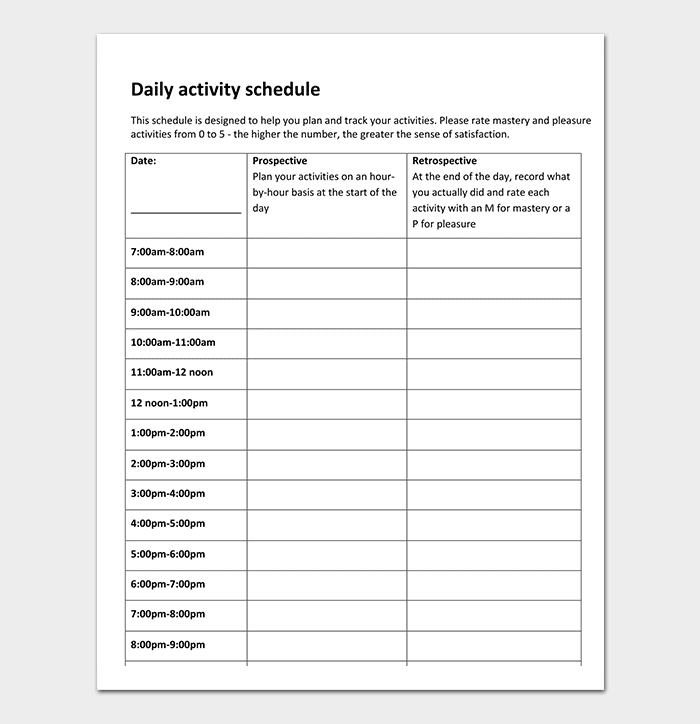24 Hour daily agenda (30 minute blocks)
This was from David Burns Feeling Good and I found it quite useful at various points. Basically:
1 Use a form or make your own spreadsheet with all 24 hours of the day covered but split up even further into 30 or 15 minute blocks. It also has a section to report what you scheduled vs what you ended up doing
2 Brainstorm all the things you need or would like to get done and give a time estimate for each based on how long its taken you ideally in the past
3 Schedule each item based on how much effort/complexity it requires (earlier = more complex/energy-intensive) and make sure the tasks are spaced so that there is enough time and a little buffer for breathing room (based on your durations)
Sorta looks like this, can’t seem to find the original necessarily but you get the point

Very useful and practical tool
Please name the tool/exercise and limit to CBT for this thread (I want to cover and discover others in future topics focused on them). I really want to avoid boilerplate namedropping “this or that therapy but you’d have to pay to see a therapist, you wouldn’t understand”. That just not helpful, please elaborate Any pedantic replies not answering question won’t be entertained


I’ve been doing cognitive behavioural therapy to try and sort out my depression and I found that having to stick to an exact time table actually made it worse, instead I’ve just got to try and get one thing done at some point every day and then each week I add another job on untill I’m able to get all of them done like a functioning person.
I’m also supposed to pair it with doing something that I enjoy that gets me out of the house but I keep forgetting to do that bit.
You can actually still do that this way, just adapted for like 1 task a day and maybe schedule it and you can increase or decrease it based on where you’re at. I like that whole 3 things idea, but 1-2 is fine too. I’m guilty of trying to shoehorn myself into superman level performance when I’m laughably off that time
My theory is it sort of tricks you into mentally rehearsing yourself carrying out what seems to be the impossible when you’re in a bad way and to get it out of your head and processed
I did a Behavior Activation Therapy course and we used a tool similar to what you posted in the OP.
Only we listed a few activities along with how difficult we thought it would be. Each morning we would reflect on the activities we got done and write down how difficult they actually ended up (sometimes more or less). And make a new list.
The process helped me to challenge a lot of thoughts and emotions around activities.
Imma supplement my system with the difficulty haha. Sort of like a behavioral exposure therapy style flavor